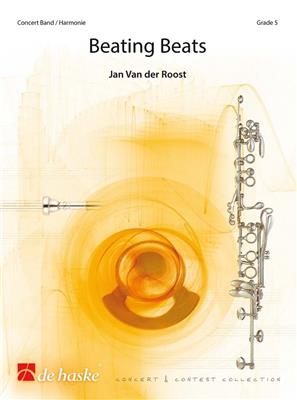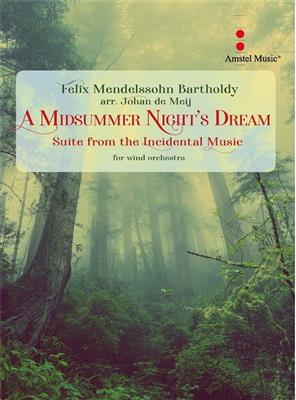Results
-
 £183.20
£183.20Finale from The New World Symphony - Antonin Dvorak
This arrangement was written for Norwegian School Band Madlamark Skolekorps to their participation at the Norwegian Championships 2023.The arrangement will work excellent also for a wind ensemble (one player to each part), but the clarinet parts should always be doubled.Euphonium II is optional, but it's recommended to use also this when there are two players or more on this instrument. Concerning percussion, timpani is the most important part, but it's recommended to also cover cymbals and mallet percussion.The articulation and dynamics are kept as close as possible to the original version by Dvorak. However, some changes has been made to make it more suitable for a wind instrumentation. The timpani part is identical to the original version except for some places when the trumpet signals are doubled in the timpani part.Staccato notation should not be played short here, but rather separated. At faster passages, the music should be played endurant or legato if possible.This arrangement is a good opportunity to perform music of highest quality where musicality, phrasing, balance and intonation are very important, and, where each musician and part are deeply involved in the music making.
Estimated dispatch 7-14 working days
-
 £97.60
£97.60Proven - Kevin Houben
'Proven' was composed by Kevin Houben on the occasion of the 100th anniversary of the Royal Wind Band 'De Volksvreugd'meaning ' People's Joy' in 2021.As its name suggests the musical band of the West Flemish village , municipality of Poperinge (B), had to bring joy againto the people. At that time there was still a striking industry of woodworkers, including that of slat splitters and hoop cutters.Moreover the cultivation of hops, necessary for the brewing of beer, remained important. Shortly after World War I theassociation was founded in the cellars of the brewer- mayor.Soon the joy was not only experienced by its listeners but also by its members. Already from its foundation onwards, thecandidate musicians flocked in and still nowadays 'De Volksvreugd' can take pride in having more than 100 members in itsyouth orchestra, having a drum band, an ambiance band and a wind band. Participation in tattoo and competitions ensuresan excellent musical level. Moreover musicians of all ages feel like family. For the previous 100 years 'De Volksvreugd' has'proven' to bring joy to the people and by the people. The chant 'Long live the Volksvreugd/ People's Joy' clearly provesits popularity.This energetic and festive composition has a very recognizable and powerful introduction, after which each musician ischallenged concerning technique, rhythm and ensemble playing. Also the magnificent melodic part, which Houben iswell-known for, is very melodious and intimate followed by a lyrical highlight to culminate into an energetic and rhythmicalfinal. Ideal for any concert!
Estimated dispatch 7-14 working days
-
 £72.99
£72.99Ironic
Ironic is the best-known song by the Canadian-American singer-songwriter Alanis Morissette. This appealing hit from the 90's, which garnered success worldwide, attracted extra attention with its charming video in which Morissette changes places and outfits while driving through the snow. Now, a version for concert band is available, skilfully arranged by Timothy Graves. It is an attractive piece that will earn much applause at your next concert - and there's nothing ironic about that!
Estimated dispatch 7-14 working days
-
 £159.99
£159.99Carnival - Thomas Doss
This work was commissioned by Marktmusik Timelkam to celebrate its 170th anniversary. It describes the cultural life and hustle and bustle of the band's home base, the Austrian town of Timelkam. Carnival pictures a festive procession starting at the marketplace and lasting well into the night. The work features many 'carnivalesque' elements and is a joy for players to perform. There is a lot of merry activity going on in the music; people cheerily chatting in the inn; singing and dancing together and having fun. There is also room for a melancholy mood, accompanied by reminiscences about eternal goodbyes and searching for love. With the added musical representation of children's playing and pranks, a beautiful sunrise as well as a depiction of the churches and societies in town, this composition is not just an account of a carnival parade but a small portrayal of life.
Estimated dispatch 7-14 working days
-
 £126.50
£126.50Beating Beats - Jan Van der Roost
Beating Beats rhythmically is a rather special piece: more conventional metres are manipulated in such a way that the listener (without score) may be confused and even misled at various points! The 'regular four beat accents in a 4/4 measure for example are often not adhered to, giving the impression of a different metre altogether. However, at the same time it may be that some instruments do follow this "normal" 4/4 metre, thus confusing everyone - performers and listeners alike! On one hand, it is a "simple" piece with very playable and melodic themes, but their mysterious rhythmic makes it not only sound more complicated, but also makes for a greater challenge for both players and the conductor! As is mostly the case with Jan Van der Roost's works, the orchestration is both colourful and contrasting, with every section of the modern wind orchestra used equally. All in all, it's a work full of surprises with some unexpected harmonies and special melodic lines but above all, with metrical and rhythmical sure to catch you unawares!
Estimated dispatch 7-14 working days
-
 £152.99
£152.99A Midsummer Night's Dream - Felix Mendelssohn Bartholdy
Felix Mendelssohn Bartholdy (1809 - 1847) composed the music for William Shakespeare's play A Midsummer Night's Dream at two different times. In 1826, at the age of 16, he wrote a concert overture (Op. 21). Sixteen years later, in 1842, he composed the incidental music (opus 61) for King Frederick William IV of Prussia, in which he incorporated the existing overture. The overture premiered in Stettin (then in Prussia, now Szczecin, Poland) on February 20, 1827, conducted by Carl Loewe. Mendelssohn had to travel 80 miles through a raging snowstorm to get to the concert, which became his first public appearance. The first British performance of the overture was conducted by Mendelssohn himself on June 24, 1829, at the Argyll Rooms in London. After the concert, Thomas Attwood was given the score of the overture for safekeeping, but left it in a taxi and was never found. Mendelssohn later rewrote the overture entirely from memory.
Estimated dispatch 7-14 working days
-
 £68.80
£68.80Adagio - Kevin Houben
Johannes Brahms can be considered to be one of the top composers of the nineteenth century chamber music. He was a giant in this field and an eminent successor of Beethoven and Haydn. A masterpiece from his chamber music oeuvre is the trio in Eb opus 40 for piano, violin and natural French horn.In 1865, the year of his Horn trio, Brahms's mother Christiane died. It's well known that he fostered deep feelings for her. The slow part of the Horn trio with the tempo indication Adagio Mesto (sad) can be considered as a lamentation for his mother.The first performance of the piece took place in Zrich on 28th November 1865 and it was published a year later in November 1866.In this version for Wind Band Kevin Houben stays as true as possible to the original. The result is a deep and dark orchestration of the wonderful Adagio Mesto. A challenge for any orchestra and extremely suitable as concert piece.
Estimated dispatch 7-14 working days
-
 £102.99
£102.99Three Blind Mice - Bert Appermont
This composition is based on the children's song 'Three Blind Mice', of which the melody is featured in a range of variations: in a canon, in inversion, in minor, transformed, with changing harmonisations and orchestrations, and in different times and tempi. The work consists of three continuous, contrasting movements: 1) Mouse March: The mice cheerfully set off while the original melody is presented as a march. - 2) Hymn: In a tuneful hymn, the wonderful praises of the life of mice are sung. - 3) Catch Me If You Can: In an animated chase, the farmer's wife is trying to catch the mice. Following a stirring acceleration, she cuts off their tails in accordance with the lyrics of the song. I hope this work, with its humorous touch, will be a welcome contribution to the expansion of interesting repertoire for the lower divisions. - Bert Appermont
Estimated dispatch 7-14 working days
-
 £84.99
£84.99Yakolo - Gerald Oswald
Yakolo is originally a dance song from Africa. It reflects the people of Africa's zest for life, following the maxim 'Come and join us!'. In this work, the 'call and response' principle is featured as a trademark element of traditional African music. The rhythmic melodies invite listeners to sing and dance along and thus give shape to the African art of celebrating together. The repeating themes will be sure to put a smile on everyone's face!
Estimated dispatch 7-14 working days
-
 £209.99
£209.99Euphonium Concerto - Satoshi Yagisawa
This three-movement concerto (Allegro con brio, Espressivo and Vivacissimo) was commissioned by the famous Japanese euphonium player Tamao Araki. It demands a high level of instrumental proficiency from the soloist, while the accompaniment is less demanding and accessible for a band of an average level. Yagisawa's clever use of the euphonium's colourful sound palette with its beautiful melodic lines makes this composition a rare jewel.
Estimated dispatch 7-14 working days
